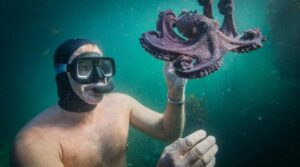The documentary’s subject is an octopus which Craig Foster meets while exploring the underwater world of his hometown, Cape Town in South Africa. Craig Foster dives underwater for almost a decade and forms an unusual relationship with an octopus. He calls her his teacher because the octopus shows him things that no human had witnessed before. But their story is almost like a love affair.
I watched My Octopus Teacher a few days before my trip to the beautiful island of Maui in Hawaii and I was intrigued to try my version of it and form an unusual relationship with a sea animal. Watch this video to see how it turned out with my turtle friend!
The film has the perfect combination of an unusual documentary subject, great storytelling, beautiful footage, and social impact. And you know who the Oscar goes to.
The documentary ignites curiosity in the first place because the subject is an octopus. And different than what we are used to seeing with David Attenborough’s documentaries, we first meet this octopus as a human-like character with ideas, habits and emotions, before getting to know scientific knowledge about her kind.
This documentary has great storytelling, because Craig Foster doesn’t tell the story of what happened to him half a decade ago, instead he tells it in present tense so that we are immersed in the action. Also, he sometimes tells it in second person like “you had that terrible feeling in your stomach” as if it happens to us as we are watching it, so that we relate more we connect more. Besides, I thought the story was very interesting since the beginning, but he connects sequences with phrases like “that was when it got interesting” or “our relationship got deeper after this incident” so he hooks the audience by saying that the story will get better and better.
Craig Foster dives into the icy cold water without wearing a wetsuit or a scuba tank because he doesn’t want to use human technology as a leverage underwater. He enters their world with their rules. The directors Pippa Ehrlich and James Reed also tell that Craig Foster knows how to capture interesting things and frame it well because he is a filmmaker and is in the business for a few decades.

And, not everything is as it seems. The directors note that most of the octopus footage was shot in a can and Craig was sent back into the environment with a cinematographer to get better images. Also, They captured some of the shots with an oxygen tank.
Still, I was impressed that Craig Foster was not like visiting the kelp forest but more like living in that environment; he was getting to know his neighbors, learning about the emotions and characteristics of animals. It’s very cool.
Did you know that there was an octopus psychologist present in the making of the documentary? Craig Foster started getting attached with scientists after becoming obsessed with the octopus and he met a marine biologist who studies human psychology. She had insight on how creatures think, and how an octopus thinks, so she was helping the filmmakers interpret what the octopus’ psychology was like.
The documentary is an environmental impact film without shouting that it is one. We watch the unusual relationship between Craig Foster and the octopus, but this has a broader message. It shows we can connect with the strangest creatures on earth.
Humans are a small part of the ecosystem, and this documentary shows only one example of how humans can connect to the natural world and think about whats possible. Craig Foster tells that their language is visible, but for only the ones who choose to look closer.
So let’s try to connect more closely with the creatures living on this planet with us to see what’s possible, and that harming them cannot possibly make us more developed.
